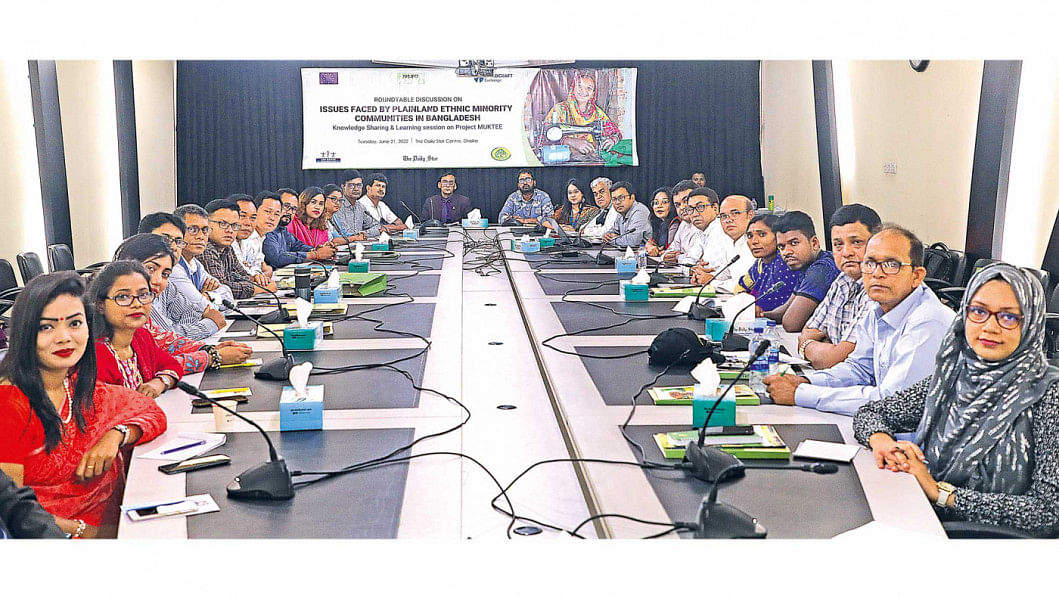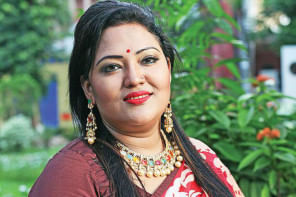Issues faced by plainland ethnic minority communities in Bangladesh

Nabila Nusrat, Head of Programme, Traidcraft Exchange
Traidcraft Exchange has been implementing the 'Fighting Forced Labour with Adivasi and Dalit Communities in South Asia (MUKTEE)' Project in Bangladesh since 2019. The project is co-funded by the European Union.Agriculture Sustainable and Socio-Economic Development Organization (ASSEDO) is the implementing partner.
The MUKTEE Project has been implemented in two Upazilas --Tanore and Nachole – in Rajshahi. We are working with the plainland ethnic minority communities of these areas to address the systematic and structural weaknesses they suffer from.
There are three main reasons behind their suffering. Firstly, they don't get the same treatment as mainstream Bengali citizens and are not skilled enough in income-generating activities. Also, they suffer from various health complications, particularly premature aging due to hard manual labour. Lastly, the natural resources in their living areas are depleting rapidly, and, therefore, they are losing their alternative sources of food and ways to earn a living.
Unfortunately, there is no social safety net programme to support these vulnerable communities. We started working on two areas: food and income opportunities. We are trying to include them in social safety net programmes so that they get food assistance. They are also being trained in various skills so they can participate in income-generating activities.
Foyzul Bari Himel, Consultant, TTC
Over the years, people in ethnic communities have been deprived of things that are rightfully theirs, such as the ponds in their localities or the fruits growing on trees that they themselves planted. They are faced with these restrictions because they are made to believe that there will be problems as these are the properties of zamindars. They have been suppressed generation after generation, held back from being able to reach a position where they could do or think for themselves.
Rabiul Alam, Executive Director, ASSEDO
Being mainly an agrarian working class, the introduction of automotive technology has greatly reduced the number of work opportunities for plainland ethnic minority communities. Our target for the MUKTEE Project has been to enhance the skill of this group and create alternative livelihood opportunities for them, teaching them things such as sewing, masonry, mobile phone servicing, etc. We have also provided training on various hardware and software programmes for members from 2,000 families. Although our training period was only two weeks long, it has led to them finding jobs in fields not related to traditional agriculture.
Sagor Marandi, World Vision
The MUKTEE Project has been successful in helping the disadvantaged ethnic minority communities generate some savings from their income, but whether it has been done with sustainable solutions remains to be seen.
The situation of the tea workers in Sylhet is an example of modern slavery. They are underpaid, deprived, and discriminated. A tea worker can't work outside the tea garden, and we were not allowed into the garden to talk with them.
Camillus Kamol Gandhai, Project Coordinator Development, CARITAS
We work with the indigenous people, especially the Santals, who have their own traditional social organizations. We make sure that even after our project is completed, the indigenous people can help themselves through their organizations.
The government should be involved in the development of ethnic minorities. Representation of the ethnic minority communities must be ensured at the policy level.
Mohammed Rabiullah, Program and Research Officer, SEHD
The Ministry of Cultural Affairs has enlisted 50 ethnic communities, though some ethnic communities have still been left off the list. They should be recognized by the government immediately, and they should also be included in the ongoing national census.
Sheikh Shahed Rahman, Chief of Party, Save the Children
The education policy of 2010 pledges that all the children from ethnic minority communities will be given early education in their mother tongue. Although some ethnic groups receive books in their mother tongue, there aren't enough teachers to instruct them.
The Department of Youth Development has the aim to develop the skills of all young people by 2025 and the youth from these communities must be included.
Amitabha Ghosh, Senior Program Manager, IRI
Generally, women in our society are vulnerable. However, the women from ethnic minority communities are more vulnerable as they have little access to local administrative bodies to lodge a complaint.
Alexius Chincham, National Project Coordinator, ILO
The Government of Bangladesh has adopted various policies and laws to protect indigenous peoples in the country and establish rights in line with international norms. However, the government has yet to ratify ILO Convention 169 on indigenous and tribal peoples.
There should be separate ministry for Plainland communities, such as the Ministry of Chittagong Hill Tracts Affairs that looks after the issues of ethnic communities who are living in Chittagong Hill Tracts.
Md. Tajul Islam, Adviser, Bangladesh Legal Aid and Services Trust (BLAST)
We have found that there are three primary reasons ethnic minority communities lose their land. One is the acquisition of land by the government and autonomous bodies. Another is the forceful eviction of these people from their homes and lands, and the last is the process of land transfer. The DC offices do not keep a record of lands that have been illegally transferred.
AKM Mamunur Rashid, Program Specialist, UNDP
Starting from primary school, we must begin teaching acceptance and accommodating others at a cultural level. Second, we must motivate the members of the ethnic minority communities to think outside of just owning land as a means of livelihood. Thirdly, most of the farmlands in the northern areas are being transformed into orchards since fruit cultivation requires less water and labour.
Aroti Munda, A representative from Munda community
We still face discrimination in getting access to government services. We are educated and yet struggle when we go to government offices. Just imagine how an uneducated community member feels at that place. They wouldn't even want to go there to begin with. So how will our rights be ensured if we aren't treated as equal citizens?
The MUKTEE Project has helped us, and we do not take money from the Mahajan anymore. We have formed a cooperative association and take loans from it with lower interest rates. It has helped us become independent, and it has also encouraged us to save for our future. Now, we are confident to seek services from government offices. However, we still don't get all the government allowances. None of our women, for example, have received maternity allowance from the government. If there were officers from our community, we would have known about these issues.
Biplob Coda, A representative from Coda community
We often hear that tribal people cannot dream. This isn't correct. They can dream bigger dreams, but it's just that they aren't given the right opportunities, and they don't have enough leaders to guide them. They also face harassment in many places which often crushes their dreams.
Government officials often omit our surname from national IDs and government records. For instance, one of my relatives is named Ajin Coda but in his national ID his name is mentioned as Ajin. The registrar omitted Coda from the records as our family title seemed uncivilized to him. Now, my uncle Ajin cannot get government allowances for underprivileged ethnic groups of the plains as the government officials want proof of his indigenous identity.
We hear about quota in government jobs for indigenous people, but on the ground, there is no such thing. There have been instances where we have been asked to pay BDT 800,000/- just to be considered for a government job.
Shahed Ferdous, Country Director, Traidcraft Exchange
From the very beginning, the MUKTEE Project has been working with multiple stakeholders because we know that it is not possible to address issues of the ethnic minorities all by ourselves.
We need to promote locally led initiatives and establish strong local institutions so that the plainland ethnic minority communities can address their problems on their own.
In the second stage of this project, we will try to institutionalize the savings initiatives of ethnic minority communities by forming cooperative associations.
We can form a caucus involving all the relevant stakeholders to address the issues faced by the plainland ethnic minority communities in Bangladesh in a coordinated way.
Recommendations
- Establish a separate ministry for plainland ethnic minority communities.
- All the ethnic minority communities should be recognized by the government.
- A separate land commission should be formed for plainland ethnic minority communities.
- Include all the plainland ethnic minority communities in social safety net programmes and the national social security strategy.
- The youth of the plainland ethnic minorities should be included in the government-led youth development programmes.
- A common platform and partnership agreement should be formed to ensure that similar development work for plainland ethnic minority communities is continued by different NGOs in collaboration.

 For all latest news, follow The Daily Star's Google News channel.
For all latest news, follow The Daily Star's Google News channel. 



Comments